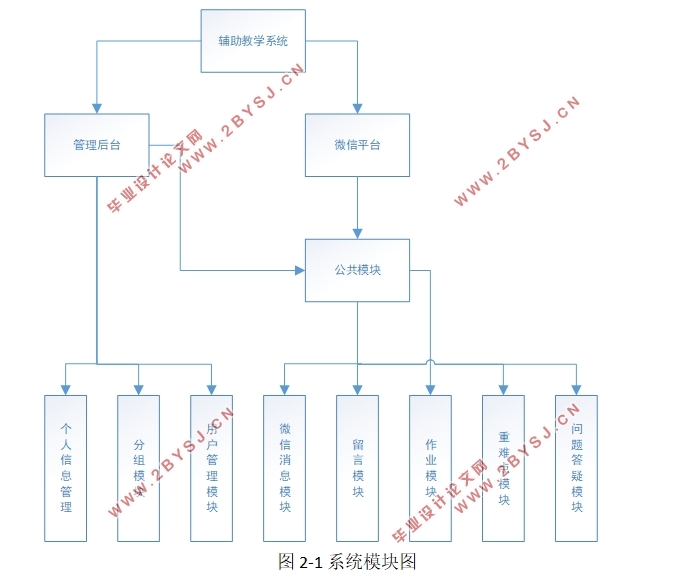基于微信公众平台的课程辅助教学系统的设计
无需注册登录,支付后按照提示操作即可获取该资料.
基于微信公众平台的课程辅助教学系统的设计(任务书,开题报告,论文16000字,参考代码)
摘要
微信作为新兴的交流方式给大学教学带来了新机遇。为了辅助教师讲授,提高教学效率,本文结合微信的特点和功能设计了一个辅助教学系统。系统基于Web方式实现,建立在微信公众平台之上,开发技术包括JAVA以及相关的开源框架,使用了nginx服务器以及Tomcat。
本次毕业设计完成后能够得到一个实际运行的微信公众号和相应的管理后台。整个系统能够在服务器上长期稳定的运行。可加强师生交流,系统主要围绕作业,重难点,留言,问题答疑等展开,布置作业和发布重难点时,利用微信公众平台的消息推送功能可以很方便的将消息推送给每个关注的用户,留言和问题答疑可以加强师生交流和互动。
通过本次研究探索,验证了微信在辅助教学中的可行性,促进了师生间的交流与沟通,拓宽学习内容和学习途径,具有较好的使用价值和现实意义。
关键字:微信公众平台;辅助教学;JAVA;
Abstract
As a new micro-channel communication to university teaching has brought new opportunities. To assist teachers in the teaching, improve teaching efficiency, this paper, micro-channel features and functions designed to assist a teaching system. Web-based system to achieve, built on micro-channel public platform, the development of technologies, including JAVA and related open source framework used nginx server and Tomcat.
After the design is completed graduation can get the public micro-channel number and the corresponding actual operation of a management background. Long-term stability of the entire system can be run on the server. Enhance teacher-student interaction, the system mainly focus on operations, heavy and difficult, message, question answering and other expansion, when heavy and difficult assignments and publish, push messaging feature utilizes micro-channel public platform can easily be pushed to message each user's attention , answering comments and questions may strengthen student exchange and interaction.
Through this research and exploration to verify the feasibility of micro-channel assisted teaching, and promote exchanges and communication between teachers and students, to broaden the learning content and learning pathways, with good value and practical significance.
Keywords:WeChat public platform,assistance teaching,JAVA




目录
摘要 I
Abstract II
第一章绪论 1
1.1 研究背景 1
1.2 研究内容 2
第二章系统分析与设计 3
2.1 系统分析 3
2.2 系统设计 4
2.2.1 概要设计 4
2.2.2 基本设计概念 4
2.2.3 模块概述 5
2.3 详细设计 6
2.3.1 管理员模块 6
2.3.2 作业模块 7
2.3.3 重难点模块 8
2.3.4 留言模块 8
2.3.5 问题答疑模块 9
2.3.6 分组模块 10
2.3.7 用户模块 11
2.3.8 微信消息模块 12
2.4 数据库设计 12
第三章系统实现 19
3.1技术选择 19
3.2目录设计 20
3.3难点解决方案 21
3.4公共类实现 22
3.5 定时模块 23
3.6 业务实现 24
3.6.1 微信模块 24
3.6.2 作业模块 26
3.6.3 重难点模块 27
3.6.4 留言模块 28
3.7 界面原型 28
第四章项目测试与部署 33
4.1 测试 33
4.2 服务器运行环境搭建 34
4.3 项目部署和访问 36
第五章结论 38
5.1 工作总结 38
5.2 工作展望 38
参考文献 39
致谢 40
